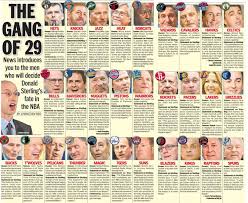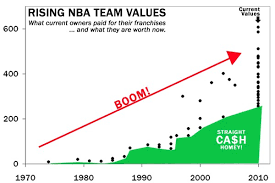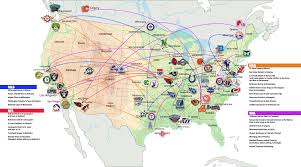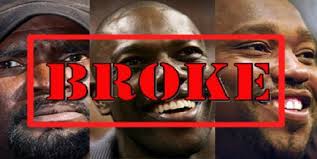Effective October 21, 2014, the Board of Governors of the National Basketball Association (NBA) adopted new investment standards that limit the total number of persons that may own equity interests


Effective October 21, 2014, the Board of Governors of the National Basketball Association (NBA) adopted new investment standards that limit the total number of persons that may own equity interests

I’m a person. I’m a father. I’m an artist, I’m a writer, I’m a painter, I’m a musician. And sometimes I play basketball. Larry Sanders (“Sanders”), a 6’11” center

On April 9, 2013, Marquette University Law School and the Milwaukee Journal Sentinel sponsored a symposium titled “A New Milwaukee Sports and Entertainment Arena? Defining the Benefits and Dividing the

The National Basketball Association has experienced several relocations of league teams since 2001: 2001 – Vancouver Grizzlies relocated to Memphis, Tennessee. 2002 – Charlotte Hornets relocated to New Orleans, Louisiana.

“Hustler” Bill Veeck was a baseball executive and principal owner of a number of major league baseball franchises, and was inducted into the Baseball Hall of Fame. Veeck in his

According to a Sports Illustrated article dated March 23, 2009 entitled “How (and why) Athletes Go Broke,” within five years of retirement, sixty percent of former NBA players have gone
A university has a vested interest to see that coaches’ contracts are contractually fulfilled, to prevent movement of a coach to a same or similar position during the term of the contract, especially within the same Conference, to prevent use of trade secrets or confidential information obtained during the coaching tenure, to prevent solicitation of enrolled student-athletes or recruits, and to minimize the outrageous costs of replacement.
Jason Been was a sports enthusiast. An avid baseball fan, a Brewers batboy, and a high school baseball star. Sports was his passion and ultimately became his lifelong avocation. This quiet and humble man became a universally respected genius in the sports industry. Jason Been was a statistical sports wizard, a walking encyclopedia of sports facts and figures, and a "go to guy'' in the industry. I had the privilege of discussing the business of sports with Jason on my Time Warner cable sports show, Sport$Biz. His knowledge, ability to prognosticate, and understanding of what has now become a multi-billion dollar industry was only to be admired.
College coaches, administrators and conferences are struggling with the boundaries on what exactly crosses the line in reprimanding, chastising, disciplining, or dishing out what's known as “tough love” to student athletes. Universities need be more concerned with protecting their athletes from an abusive coach than protecting themselves from legal action. Abuse is not good coaching, even when it results in winning. Placing winning games or revenues above sportsmanship, decency, fairness, and ethics is out of the question.
Ron Prince began his coaching career as a volunteer assistant coach at Dodge City Community College working with offensive tackles and tight ends. In 1993, Prince received his first full-time coaching position at Alabama A&M. Following one year at Alabama A&M, Prince made multiple coaching stops at South Carolina State, James Madison, Cornell, and Virginia before getting the coaching break of his career. In late 2005 Prince was named the head football at Kansas State University (KSU). Prince inherited a team from the most successful coach in KSU history, Bill Snyder. In 2006 Prince led the Wildcats to a winning record of 7-6 and a bowl game berth, and followed up that season with two successive losing seasons of 5-7, finishing with a final coaching record of 17-20. Prince was terminated by KSU after the 2008 season (effective Dec. 31, 2008), triggering litigation that would divide the university, its employees, and its supporters.